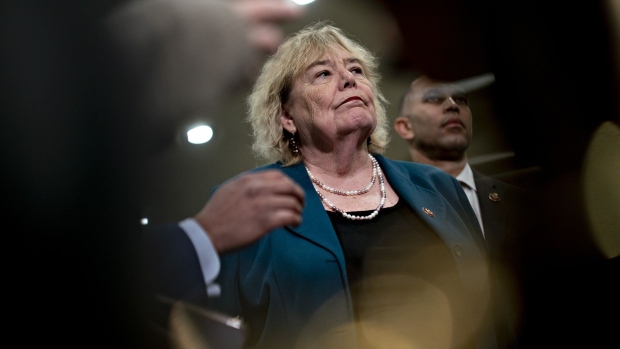Sep 21, 2022
US House Lawmakers Are Trying to Raise the Bar for Challenges to Election Results
, Bloomberg News

(Bloomberg) -- The US House voted Wednesday to dramatically raise the bar for objections to presidential election results, the first step in a drive to overhaul a 135-year-old law and prevent another crisis triggered by false claims of a stolen election.
On a 229-203 vote, House lawmakers passed a bill that grew out of the investigation into the Jan. 6, 2021, insurrection at the US Capitol and attempts by former President Donald Trump and his allies to exploit the 1887 Electoral Count Act in order to delay or stop congressional certification of President Joe Biden’s victory in the 2020 presidential election.
“Our bill will preserve the rule of law for all future presidential elections by ensuring that self-interested politicians cannot steal from the people the guarantee that our government derives its power from the consent of the governed,” Wyoming Republican Representative Liz Cheney said during debate on the legislation.
Cheney and the bill’s other sponsor, Democratic Representative Zoe Lofgren of California, are members of the House panel investigating the insurrection.
A similar bill is working its way through the Senate, and any final action to merge the two versions for final passage won’t happen until after the November midterm elections, in which there are at least 45 Republican candidates on the ballot for the House and Senate who have either said the 2020 election was stolen or cast doubt on its legitimacy. That has raised the level of urgency among backers to pass the overhaul before a new Congress takes over in January, likely with a Republican majority in the House.
The legislation passed mostly along party lines, with Cheney of Wyoming joined by only eight other Republicans voting in favor. House GOP leaders had urged their members to vote against it. A notice from the chamber’s second-ranking Republican, Representative Steve Scalise of Louisiana, described the bill as “the Democrats’ latest attempt at a federal takeover of elections in order to stack the electoral deck in their favor.”
During an appearance Monday evening at the American Enterprise Institute in Washington, Cheney, who is isolated within her party, said the purpose of the legislation is “very clear.”
“This is to prevent future attacks during election processes,” she said.
The Senate version is sponsored by Senators Susan Collins, a Maine Republican, and Joe Manchin, a West Virginia Democrat. It’s getting final tweaks by leaders of the Senate Rules Committee to both draw additional support and more closely align it with the House version, said panel chair Amy Klobuchar, a Minnesota Democrat.
“We’re all working very closely” with the House, Klobuchar said. “They understand that our version is not going to be the exact same, and we all have a common goal of passing a bill by the end of the year.”
The Senate bill now has 10 Republican and 10 Democratic co-sponsors, meaning it would clear the 60-vote threshold to advance in the 50-50 chamber.
Both bills seek to put most election disputes into courts -- where Trump and his allies lost more than 60 cases seeking to overturn the results -- and more narrowly define the role of the vice president in presiding over the certification of the Electoral College vote. Trump pressured then-Vice President Mike Pence to delay or block the 2020 electoral vote certification, which Pence refused to do.
The most significant difference between the two versions is how Congress deals with objections to presidential elector slates. Currently, it takes only one member each in the House and Senate to force a debate and vote. The House bill would require one-third of each chamber of Congress to object to a state’s presidential electors before a vote is held. The Senate’s version would require a fifth of members from each chamber to object.
In 2021, 139 Republican representatives - nearly a third of the House -- objected to electors for Biden from Arizona and Pennsylvania, but only eight Republican senators.
Klobuchar said she doesn’t believe the changes being made to the Senate bill would include matching the House’s threshold of one-third of both chambers objecting.
Genevieve Nadeau, a lawyer with the nonpartisan group Protect Democracy who is tracking the legislation, said that the differences are minor and can easily be resolved.
“The most important thing at the end of the day is fixing this antiquated statute,” she said.
©2022 Bloomberg L.P.







